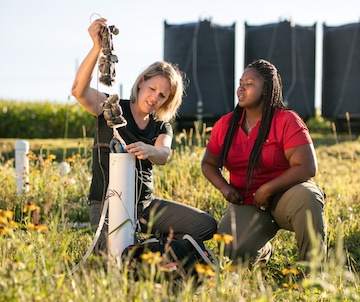October 5, 2017

This is a media release sent by manufacturers and other agriculture businesses and distributed directly.
The Iowa Nutrient Research Center at Iowa State University has funded 11 new projects related to water quality.
Researchers from Iowa State and the University of Iowa will collaborate on the projects with those from Iowa Department of Natural Resources, the Iowa Soybean Association, the Nature Conservancy and East Carolina University. This is the fifth year the center has funded research. More: http://www.cals.iastate.edu/nutrientcenter/project
The projects are:
Does Quantity and Quality of Tile Drainage Water Impact In-stream Eutrophication Potential? Evidence from a Long-term Biofuel Cropping Systems Experiment
will measure chemical composition and the potential of subsurface drainage to cause a detrimental overabundance of nutrients from a variety of management practices.
Impacts of Cover Crops on Phosphorus and Nitrogen Loss with Surface Runoff
will continue an existing study for two more years (conducted under natural rainfall) to evaluate impacts of a winter cereal rye cover crop on soil, nitrogen and phosphorus loss with surface runoff in a field testing high in phosphorus, managed with a corn-soybean rotation.
Total Phosphorus Loads in Iowa Rivers and Estimation of Stream Bank Phosphorus Contribution
will use new topographical information to expand on the evaluation and quantification of phosphorus loads in Iowa rivers.
Water Quality Evaluation of Prairie Strips Across Iowa
will assess the effects of prairie strips on the quantity and quality of surface water runoff from cropped watersheds, the effects of prairie strips on dissolved nutrient concentrations in shallow groundwater and disseminate project information through field days, presentations and Iowa State University Extension and Outreach fact sheets.
Delivery-scale Evaluation and Modeling of Nutrient Reduction Practices
will focus on delivery-scale evaluation and modeling of the effectiveness of in-field and edge-of-field practices including cover crops, fertilizer management and wetlands in increasing ecosystem nitrogen and phosphorus retention and reducing downstream nutrient loads.
Amounts and Forms of Dissolved Phosphorus Lost with Surface Runoff as Affected by Phosphorus Management and Soil Conservation Practices
will study dissolved phosphorus in runoff for a wide range of soil P levels, fertilizer and manure P management practices and soil conservation practices.
Woodchip Bioreactors for Improved Water Quality
will evaluate nitrate-nitrogen fate in woodchip bioreactors over a range of water retention rates, while gaining knowledge about improved bioreactor design for field implementation.
Improving the Effectiveness of Conservation Programs through Innovative Reverse Auctions and Sensible Enrollment Restrictions
will assess the value of reverse auctions and enrollment restrictions in improving the cost-effectiveness of conservation programs offered to Iowa farmers.
Limiting Nitrogen Immobilization in Cover Crop Systems
will look at ways to fine-tune cover crop management so nitrogen immobilization is unlikely and it can be mineralized for crop use.
Successful Voluntary Watershed Improvement Projects: Do Short-Term Adoption and Outreach Lead to Attitude Changes and Long-Term Sustainable Practice Adoption?
will study the structural practices of conservation practices adoption and assess and compare farmers¹ and local stakeholders attitudes toward water quality and conservation within intervention and non-intervention watersheds.
Baseline Assessment of Geisler Farm Site: Collection of Pre-BMP Monitoring Data
will collect baseline monitoring data at a farm in Calhoun County to characterize the soil, geology, hydrology and water quality conditions of the farm prior to the establishment of conservation best management practices.
The Iowa Nutrient Research Center was created in response to legislation passed by the Iowa Legislature in 2013. The center pursues science-based approaches to evaluating the performance of current and emerging nutrient management practices, providing recommendations on implementing the practices and developing new practices.
You May Also Like




